
By:
- Christine Clark
Published Date
By:
- Christine Clark
Share This:
NAFTA at 20
Art, culture, politics and economics intersect at Mexico Moving Forward symposium
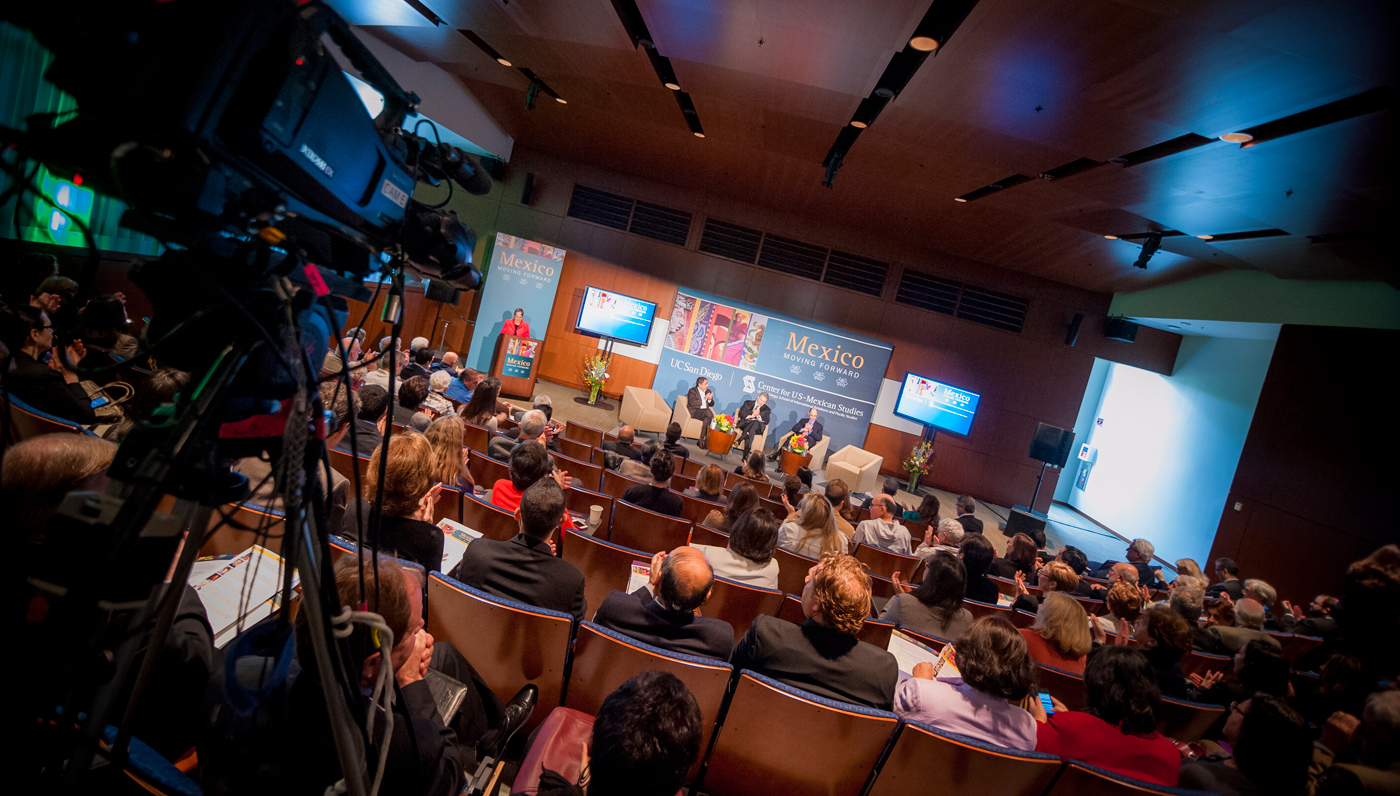
Photos by Erik Jepsen/UC San Diego Publications
Mexico’s recent fiscal and energy reforms, new trade alliances, growing economy and evolving arts and culture were at the center of UC San Diego’s Mexico Moving Forward symposium held on campus March 6. Hosted by the Center for U.S.-Mexican Studies (USMEX) at UC San Diego’s School of International Relations and Pacific Studies (IR/PS), the symposium focused on “20 Years of NAFTA and Beyond” and assessed the impacts of the North American Free Trade Agreement, which officially began on Jan. 1, 1994.
The standing-room-only event kicked off with welcome remarks from University of California President Janet Napolitano, UC San Diego Chancellor Pradeep K. Khosla and IR/PS Dean Peter Cowhey. They were followed by four sessions in which policymakers and leaders of top think tanks from both sides of the border discussed NAFTA and Mexico’s current reform agenda as well as opportunities to increase commercial linkages with Asia.
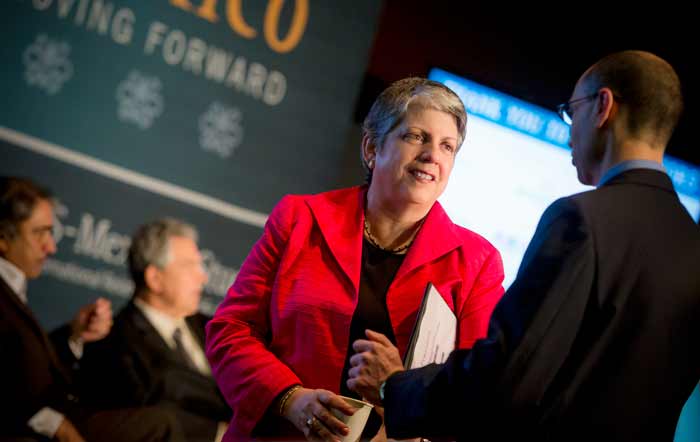
Center, University of California President Janet Napolitano
“It was the famed Pulitzer Prize-winning poet of Mexico, Octavio Paz, who once said ‘dialogue is a signal of democracy,’” Napolitano said at the beginning of the event. “And it is in this spirit that we gather here today.”
Napolitano went on to describe an upcoming UC initiative that will strengthen UC’s ties with Mexico through student exchange and research collaboration. “It will be an initiative where both sides will have ownership, it will be an opportunity for dialogue in which voices from both sides will co-exist.” She added, “There is a world of possibilities for this partnership.”
Napolitano’s address was followed by remarks from Khosla who spoke about how UC San Diego is uniquely positioned on the border, giving opportunity for increased engagement, collaboration and exchange with Mexican scholars and students.
“Our Mexico Moving Forward symposium underscores our commitment to our binational border region,” said Khosla. “UC San Diego has a long history of partnership with Mexico, especially with our Center for U.S.-Mexican Studies, which continues to strengthen our collaborative ties. We continue to work together to improve the lives of citizens in both countries.”
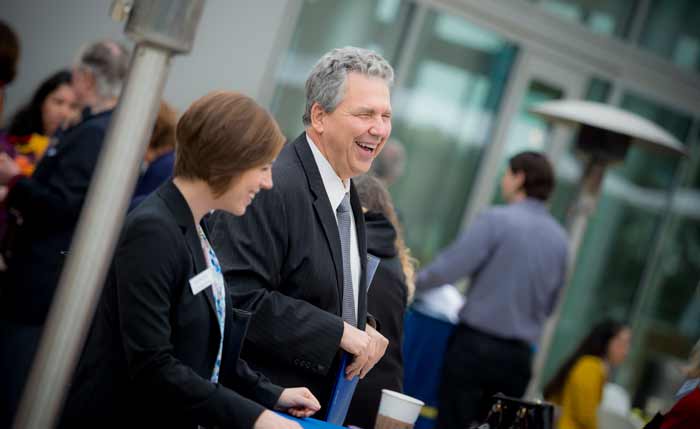
Center, IR/PS Dean Peter Cowhey
Cowhey also spoke to the rich benefits of the U.S. and California having a more collaborative relationship with Mexico, a major impetus behind the tradition of Mexico Moving Forward, which was first launched as part of UC San Diego’s 50th Anniversary celebration in 2011.
“We created Mexico Moving Forward as a convening of scholars and leaders to undertake an open dialogue based on serious reflection and thought,” Cowhey said. “We believe that the university environment is the perfect incubator, and UC San Diego has had a long tradition of fostering policy-relevant research on Mexico.”
Cowhey added that the symposium was a perfect opportunity to celebrate Mexico as a strong North American partner to the U.S. and the prospects of both countries creating positive change for the world.
Mexico Moving Forward’s first session was dedicated to examining changes in the last two decades in Mexico that have been brought about because of NAFTA. It was moderated by UC San Diego political science professor Peter Smith and featured some of Mexico’s most prominent business leaders, such as Juan Gallardo, chairman of board at Organizacion CULTIBA and Kenneth Shwedel, board member at Grupo Viz. Smith spoke to the diplomatic benefits of the agreement. “People can debate much if NAFTA has been more successful for Mexico than it has for the U.S.,” he said. “But one of the primary goals of NAFTA was to improve the U.S. relations with Mexico. Our bilateral relations have improved tremendously over the years and [the U.S. and Mexico] pulling together has been a very important aspect of this trade agreement.”
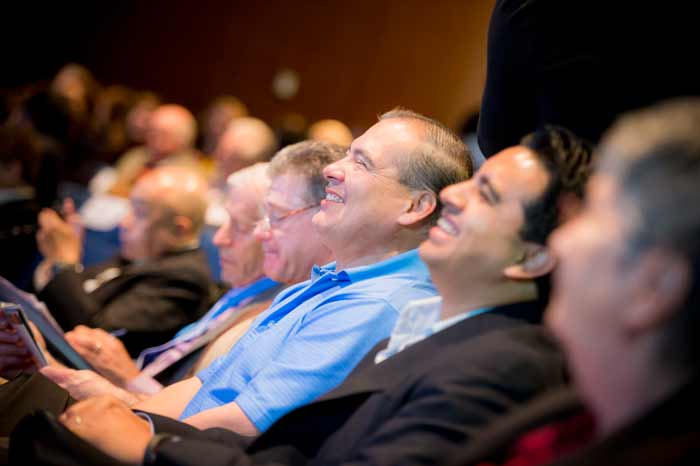
The second session was dedicated to panelists discussing how the opening of the Mexican economy under NAFTA has changed the dynamics of government support for the arts in Mexico and affected the ability of writers, filmmakers, actors, musicians and artists to reach international audiences. The event was moderated by UC’s Institute for Mexico and the United States (UC MEXUS) director Exequiel Ezcurra, who spoke about the need to convince leaders from both countries that art and culture are important national assets. “I am a scientist, but think that without art and culture we have no future,” Ezcurra said. Attendees were then treated to a surprise “flash-mob” performance by Opera Ambulante from the Centro Cultural Tijuana (CECUT).
The third session brought together leaders of several top think tanks to discuss how President Enrique Pena Nieto’s new reform agenda will support Mexico in taking advantage of new opportunities for growth. Clare Seelke of the Congressional Research Service spoke about the bi-national challenge of migration. The panelists concluded the session by speaking about solutions to problems of persistent violence and economic inequality blocking reforms in Mexico. “We need to harmonize changes in Mexico’s federal and state governments,” Seelke said.
Closing out the daylong symposium was a look beyond North America to nations in Asia, across the Pacific. This session examined how the economic ties between Mexico and Asia can be strengthened and the role Mexican foreign policy will have on the world’s stage in the 21st century. Panelists included Susan Shirk, Ho Miu Lam Professor of China and Pacific Relations at IR/PS, Arturo Sarukhan, former Mexican Ambassador to the U.S., and Carlos Elizondo, a professor at the Centro de Investigación y Docencia Económica (CIDE). It was moderated by Gordon Hanson, a Pacific Economic Cooperation Chair in International Economic Relations at IR/PS. The panelists spoke about the prospects of Mexico becoming a global economic, diplomatic and strategic power. “The opening wedge is to create an economic relationship [with countries like China],” Shirk said. “Once Mexico has deeper diplomatic relations with countries in the Asia Pacific, it will have to learn how to foster those relationships.”
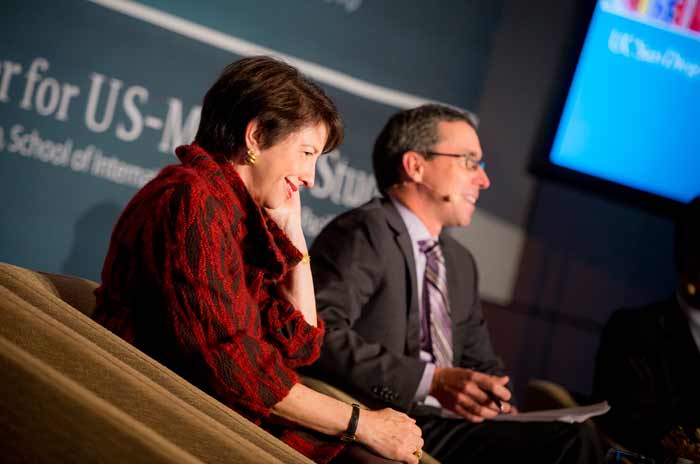
From left, Susan Shirk and Gordon Hanson
Prior the symposium, Denise Dresser, a professor at the Instituto Tecnologico Autonomo de Mexico, delivered a keynote address to more than 180 guests titled “Mexico under the ‘New’ PRI: The Good, the Bad and the Ugly” at a dinner on March 5. A frequent commentator on Mexican politics in the U.S., Mexican and Canadian media, Dresser also reflected on her time as a visiting fellow in 1994 at the Center for U.S.-Mexican Studies.
According to Melissa Floca, associate director of the Center for U.S.-Mexican Studies, the symposium was an excellent forum for dialogue this year. “We had wide ranging discussions focused on Mexico´s growth, challenges and opportunities on the 20th anniversary of NAFTA,” Floca said. “The exciting conversations that took place among speakers and conference participants underscores the importance of providing the opportunity to bring together transformational leaders committed to the future of Mexico and the bi-national relationship.”
Share This:
You May Also Like
Stay in the Know
Keep up with all the latest from UC San Diego. Subscribe to the newsletter today.


